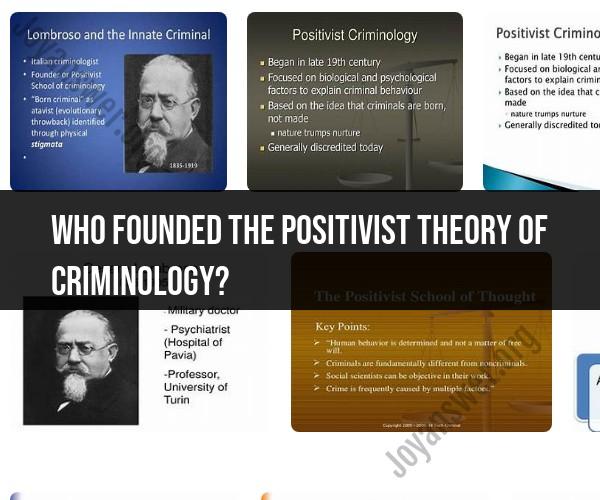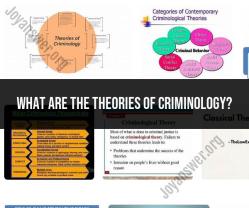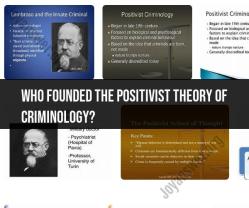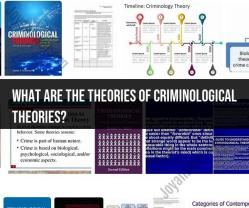Who founded the positivist theory of Criminology?
The founder of the Positivist School of Criminology is often credited to Cesare Lombroso, an Italian physician and criminologist. Lombroso's work laid the foundation for the development of positivist criminology, which focused on the scientific and empirical study of criminal behavior, as well as the idea that factors beyond an individual's control, such as biological and psychological traits, could contribute to criminality.
Cesare Lombroso's most influential work in this regard was his book "L'Uomo Delinquente" ("Criminal Man"), which was first published in 1876. In this book, Lombroso introduced the concept of the "born criminal" and argued that some individuals were biologically predisposed to criminal behavior due to certain physical and psychological characteristics. He believed that these individuals could be identified based on their physical attributes, such as the shape of their skulls and other anatomical features.
Lombroso's ideas were controversial and have been criticized for their reductionist and deterministic views on criminal behavior. However, his work played a significant role in shifting criminology towards a more scientific and empirical approach, emphasizing the study of causes of crime, and exploring the role of factors like genetics, mental health, and social environment.
While Cesare Lombroso is considered the founder of the Positivist School, other scholars, such as Enrico Ferri and Raffaele Garofalo, also contributed to the development and dissemination of positivist criminological ideas during the late 19th and early 20th centuries.
The Founders and Pioneers of Positivist Criminology
Positivist criminology is a school of thought that emerged in the late 19th century. It is based on the idea that crime is a product of biological, psychological, and social factors. The founders and pioneers of positivist criminology include:
- Cesare Lombroso: Lombroso was an Italian physician who is considered the father of positivist criminology. He believed that criminals were born with physical and mental characteristics that made them more likely to commit crime.
- Enrico Ferri: Ferri was an Italian jurist and criminologist who was a student of Lombroso. He believed that crime was caused by a combination of biological, psychological, and social factors.
- Raffaele Garofalo: Garofalo was an Italian lawyer and criminologist who was also a student of Lombroso. He believed that crime was a product of natural selection and that criminals were atavistic, meaning that they had inherited traits from primitive ancestors.
Cesare Lombroso and the Birth of Positivist Criminological Theory
Lombroso's work on positivism was highly influential in the late 19th century. He published a number of books on the topic, including Criminal Man in 1876 and Female Criminality in 1893. In his work, Lombroso argued that criminals could be identified by their physical features, such as a large jaw, a receding forehead, and a long nose. He also believed that criminals had certain personality traits, such as impulsiveness, cruelty, and a lack of remorse.
Lombroso's work was controversial, but it helped to lay the foundation for the field of scientific criminology. His ideas about the biological causes of crime have since been discredited, but his work helped to shift the focus of criminology away from moralistic explanations of crime and towards more scientific explanations.
Contributions of Other Notable Criminologists to Positivism
In addition to Lombroso, Ferri, and Garofalo, there were a number of other criminologists who made significant contributions to positivism. These include:
- Emile Durkheim: Durkheim was a French sociologist who is credited with developing the theory of anomie. Anomie is a state of social disorganization that can lead to crime and other forms of deviance.
- Edwin Sutherland: Sutherland was an American criminologist who developed the theory of differential association. This theory argues that crime is learned through interaction with others who are already involved in crime.
- Robert Merton: Merton was an American sociologist who developed the theory of strain theory. Strain theory argues that crime is caused by the gap between people's aspirations and their ability to achieve those aspirations.
The Evolution of Positivist Thought in Criminology
Positivist criminology has evolved over time. Early positivists believed that crime was primarily caused by biological factors. However, later positivists began to emphasize the role of social and environmental factors in crime.
Today, positivist criminologists use a variety of research methods to study crime, including surveys, interviews, and statistical analysis. They are interested in identifying the factors that contribute to crime and in developing effective crime prevention and rehabilitation programs.
Contemporary Scholars in the Field of Positivist Criminology
Some of the leading contemporary scholars in the field of positivist criminology include:
- John Gottfredson and Michael Hirschi: Gottfredson and Hirschi developed the general theory of crime, which is one of the most widely accepted theories of crime in the world.
- David Farrington: Farrington is a British criminologist who has conducted extensive research on the development of crime.
- Terrie Moffitt: Moffitt is an American criminologist who is known for her research on life-course-persistent and adolescence-limited offenders.
Positivist criminology continues to be a major school of thought in criminology today. Positivist criminologists are at the forefront of research on crime and its causes. Their work is helping to develop more effective ways to prevent and reduce crime.





